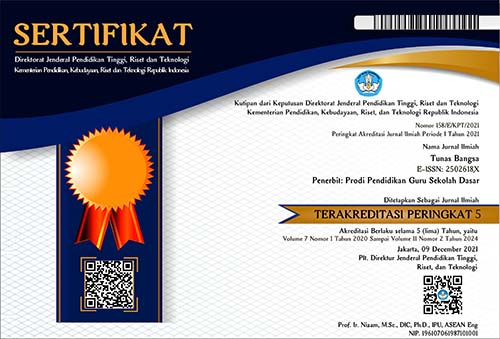PENGARUH MODEL PEMBELAJARAN COOPERATIVE TIPE Co-op Co-op TERHADAP HASIL BELAJAR SISWA PADA KONSEP SISTEM PEREDARAN DARAH MANUSIA
Abstract
Penelitian ini bertujuan untuk mengetahui perbedaan hasil belajar siswa yang memperoleh pembelajaran model Coperative tipe Co-op Co-op dengan pembelajaran diskusi pada konsep sistem peredaran pada manusia. Penelitian ini dilaksanakan di MTsN Jongar Kutacane Aceh Tenggara. Metode penelitian yang digunakan adalah eksperimen dengan rancangan penelitian pretest postest Grop design pengambilan sampel dilakukan dengan tehnik pourposive sample. Adapun sampel penelitian adalah kelas VIII b sebagai kelas eksperimen dan kelas VIII c sebagai kelas kontrol. Instrument yang digunakan untuk mengukur hasil belajar berupa tes pilihan ganda. Analisis data postes kedua kelompok menggunakan uji-t. Data hasil perhitungan hipotesis diperoleh hasil t-hitung = 2,64 dan t-tabel pada taraf signifikan 0,05 sebesar 2.04 maka t-hitung > t-tabel. Dari uji hipotesis dapat disimpulkan terdapat perbedaan hasil belajar siswa yang mengikuti model pembelajaran cooperative tipe Co-op Co-op dengan siswa yang mengikuti model diskusi pada konsep sistem peredaran darah pada manusia kelas VIII MTsN Jongar Kutacane. Kesimpulan dari penelitian ini adalah bahwa hasil belajar siswa yang memperoleh Coperative tipe Co-op Co-op mengalami peningkatan yang signifikan.
Abstract
This research aims to determine the differences in learning outcomes of students who receive Co-op Co-op type cooperative learning with discussion learning on the concept of the human circulatory system. This research was carried out at MTsN Jongar Kutacane, Southeast Aceh. The research method used was an experiment with a pretest posttest research design. Group design, sampling was carried out using a pour-posive sampling technique. The research samples were class VIIIb as the experimental class and class VIIIc as the control class. The instrument used to measure learning outcomes is a multiple-choice test. Analysis of post-test data for both groups used the t-test. Data from hypothesis calculations obtained t-count = 2.64 and t-table at a significance level of 0.05 of 2.04, so t-count > t-table. From the hypothesis test, it can be concluded that there are differences in the learning outcomes of students who follow the Co-op Co-op type cooperative learning model and students who follow the discussion model on the concept of the circulatory system in humans in class VIII MTsN Jongar Kutacane. The conclusion of this study is that the learning outcomes of students who received the Co-op Co-op type of Co-op experienced a significant increase.
References
Ariyani, I. D. (2019). Peran Tenaga Pendidik Dalam Memberikan Pembelajaran Yang Bermakna Dengan Menggunakan Pendekatan Etnomatematika, Prosiding Seminar Nasional Pendidikan FKIP, 2(1).
Bataineh, M. Z. (2015). Think-Pair-Share, Co Op-Co Op and Traditional Learning Strategies on Undergraduate Academic Performance. Journal of Educational and Social Research, 5(1).
Cahyaningsih, U. (2018). Penerapan Model Pembelajaran Kooperatif Tipe Tai (Team Assisted Individualization) Untuk Meningkatkan Hasil Belajar Siswa Pada Mata Pelajaran Matematika. Jurnal Cakrawala Pendas, 4(1).
Gillies, R.M. (2014). Cooperative Learning: Developments in Research. IJEP – International Journal of Educational Psychology, 3(2).
Ihsan, T. & Edwin, T. (2020). The Application of the Two Stay Two Stray Learning Model and Co-Op Co-Op for the Improvement of Students’ Learning Outcome in the Environmental Epidemiology Subject. Proceedings of the 3rd International Conference on Educational Development and Quality Assurance (ICED-QA 2020).
Indayani, M., & Mursalin, E. (2022). Peningkatan Motivasi dan Hasil Belajar Siswa Melalui Penerapan Model Pembelajaran Co-Op Co-Op. BIOSEL (Biology Science and Education): Jurnal Penelitian Science dan Pendidikan, 11(1).
Mahuda, I. (2017). Pembelajaran kooperatif Co-Op Co-Op dengan pendekatan open-ended untuk meningkatkan kemampuan pemecahan masalah matematis siswa sma. JPPM (Jurnal Penelitian Dan Pembelajaran Matematika), 10(2).
Maryanti, S. (2018). Model Pembelajaran Kooperatif Co-Op Co-Op dengan Pendekatan Predict-Observe-Explain untuk Meningkatkan Kemampuan Pemecahan Masalah Matematis. Jurnal Matematika, 1(3).
Meltzer, D. E. (2002). The relationship between mathematics preparation and conceptual learning gains in physics: A possible “hidden variable” in diagnostic pretest scores. American journal of physics, 70(12).
Monica, S. dkk. (2016). Model Pembelajaran Kooperatif Tipe Co-Op Co-Op Dalam Pembelajaran Fisika Siswa SMA. Jurnal Pembelajaran Fisika, 5(2).
Qurahman, M. T. (2017). Meningkatkan kemampuan pemecahan masalah kalkulus lanjut melalui pembelajaran kooperatif tipe co-op co-op. Cakrawala: Jurnal Pendidikan, 11(1).
Rahman, A., dkk. (2022). Pengertian Pendidikan, Ilmu Pendidikan dan Unsur-Unsur Pendidikan. Al Urwatul Wutsqa: Kajian Pendidikan Islam, 2(1).
Rahriansyah, dkk. (2023). Can Co-op Type Cooperative Learning Improve Students' Mathematical Generalization Ability?. Proceeding of International Conference on Education, 2.
Ruslaini, Mukhlis, A., & Yus, A. (2023). Berpikir Kritis dan Kreatif Ditinjau dari Filsafat Konstruktivisme pada Pendidikan Dasar. Guree: Jurnal Ilmiah Pendidikan Guru Sekolah Dasar, 1(2).
Rusman. (2012). Model-Model Pembelajaran. Bandung : PT Raja Grafindo Persada.
Sardiman. (2011). Interaksi dan Motivasi Belajar Mengajar. Jakarta : PT Raja Grafindo Persada.
Seriasa, N . (2020). Model Pembelajaran Kooperatif Co-op co-op Dengan Media LKS Sebagai Upaya Untuk Meningkatkan Prestasi Belajar Ipa Siswa. Jurnal Santiaji Pendidikan, 10(2).
Slavin, R. (2013). Effective programmes in reading and mathematics. School Effectiveness and School Improvement : An International Journal of Research, Policy and Practice, 24(4).
Slavin, R. (2015). Cooperative Learning. Teori Riset dan Praktis. Bandung : Nusa Media.
Suartina, G. (2021). Penerapan Model Pembelajaran Kooperatif Co–Op Co-Op untuk Meningkatkan Prestasi Belajar Yadnya Secara Online. Journal of Education Action Research, 5(2).
Sugiyono. (2014). Metode Penelitian Pendidikan. Bandung : ALFABETA.
Supriadi, D. (2017). Implementasi Manajemen Inovasi dan Kreatifitas Guru dalam Meningkatkan Mutu Pembelajaran. Indonesian Journal of Education Management and Administration Review, 1(2).
Wardana, L. W., Setyani, R., & Harwida, G. (2018). The implementation of the two stay two stray (tsts) learning model and co-op co-op for the improvement of students’ learning outcome in the crafts and entrepreneurship subject. KnE Social Sciences.
Yeshy, Y., Nirawati, R., & Husna, N. (2017). Pengaruh Model Pembelajaran Kooperatif Tipe Cooperation In Education (Co-Op Co-Op) Terhadap Kemampuan Pemecahan Masalah Matematis Siswa Pada Materi Kubus Dan Balok. JPMI (Jurnal Pendidikan Matematika Indonesia), 2(1).




















